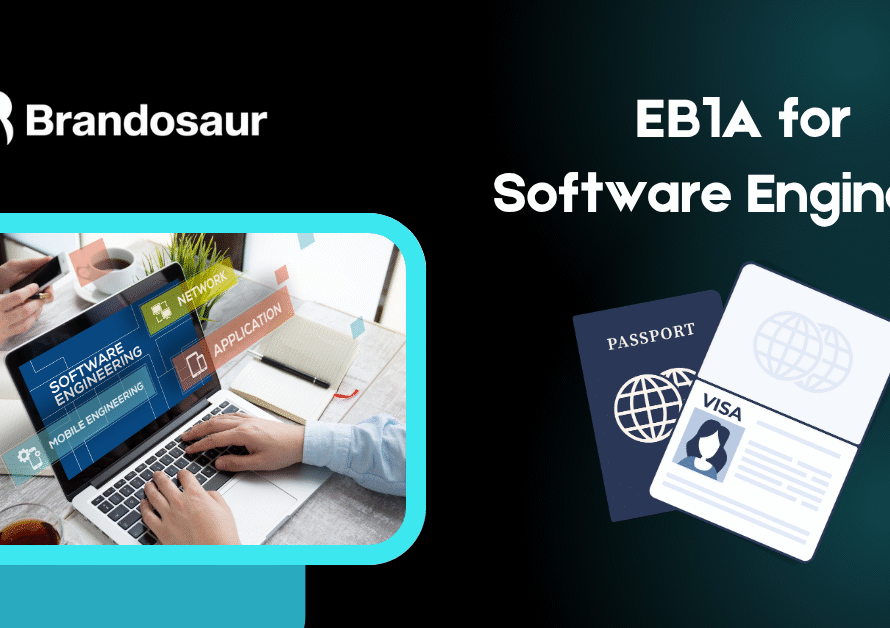US Green Card FAQs: Travel, Visa & Sponsorship Guide
- Brandosaur
- August 5, 2025
- 8:50 am
Understanding the rules around a U.S. green card can be confusing. In this FAQ-style guide, we answer common questions about travel, visa rules, family sponsorship, and other green card issues. We cover travel privileges (for example, can U.S. green card holders travel to Canada for short visits) and visa requirements (for example, Italy visa requirements for U.S. green card holders or Greece visa for U.S. green card holders).
We also discuss family petitions (such as can a U.S. citizen sponsor a cousin for a green card), as well as differences between permanent residency and citizenship (benefits of U.S. citizenship vs green card). Wherever relevant, we link to our blog for more on employment-based and extraordinary-ability green card paths.
Many questions center on travel. For example, can U.S. green card holders travel to Canada, and if so, do they need a visa or eTA? U.S. permanent residents may visit Canada for up to six months without a Canadian visa. The Canadian government confirms: Can U.S. green card holders travel to Canada without visa? U.S. lawful permanent residents can enter Canada visa-free for short visits, as long as they carry their valid passport and Green Card.
Note that travel by air to Canada no longer requires an Electronic Travel Authorization; as of April 2022, green card holders do not need an eTA.) In short, U.S. green card holder travel to Canada by air are permitted without a Canadian visa. Travel to Canada, key points:
- U.S. permanent residents (green card holders) may enter Canada visa-free for visits up to 6 months.
- You must carry a valid passport from your country of citizenship and your Green Card.
- If flying to Canada, note that an eTA (electronic travel authorization) is not required for green card holders as of 2022.
Even though a green card lets you visit Canada, it does not grant permanent status there. Moving to Canada with a U.S. green card is treated like any other immigration process: you must apply through Canadian programs (for example, Express Entry) if you want to settle there. A U.S. Green Card does not automatically give you Canadian residency; it only makes visits easier.
Can a U.S. Citizen Sponsor a Cousin for Green Card?
No, a U.S. citizen can only petition for immediate and certain close relatives. USCIS explicitly lists eligible family members: a citizen (age 21+) can sponsor a spouse, children, parents, and siblings. Cousins are not included. In other words, can a U.S. citizen sponsor a cousin for a green card? The answer is no under the current law. Only immediate family and preference categories mentioned above are eligible.
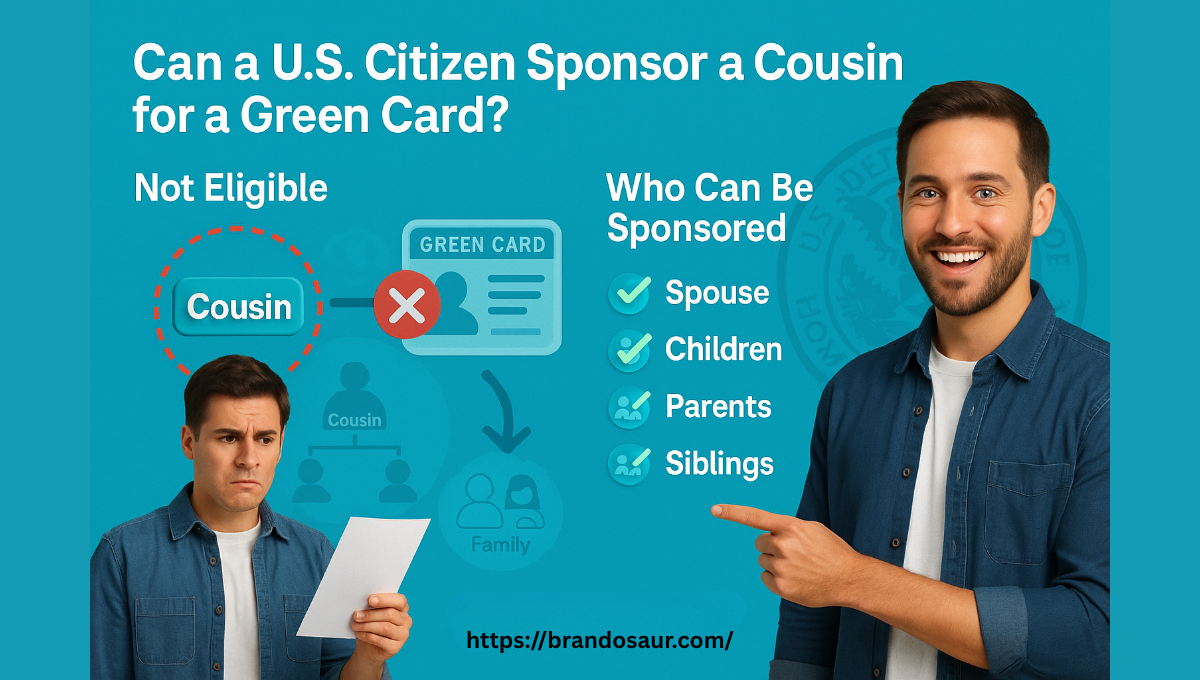
Italy Visa Requirements for U.S. Green Card Holders
Green card holders must follow Italy’s Schengen visa rules based on their nationality. In practice, U.S. permanent residents must obtain a Schengen visa to visit Italy, because visa-free travel to Schengen countries is reserved for U.S. citizens. For example, one travel advisory notes: Only U.S. citizens who hold a U.S. passport can visit Europe without a visa. Green card holders must apply for the appropriate Schengen visa. In short, a U.S. Green Card alone does not exempt you from Italy’s entry requirements.
Greece Visa for U.S. Green Card Holders
Greece is part of the Schengen Area, so it follows similar rules. U.S. citizens can enter Greece visa-free for tourism (up to 90 days). However, Greece visa for U.S. green card holders depends on your passport. If you are not a U.S. national, you must apply for a Schengen visa at a Greek consulate. In other words, being a U.S. permanent resident does not remove the visa requirement: you need a visitor (tourist) visa like any non-exempt foreign national.
Taiwan Visa for U.S. Green Card Holders
Visa rules for Taiwan depend entirely on your country of citizenship, not on U.S. residency. Taiwan grants visa-free entry (up to 90 days) to U.S. passport holders, but if your passport is from another country, Taiwan’s regular visa rules apply. In practice, a U.S. Green Card does not give you special access. If you are an American citizen with a passport, Taiwan usually imposes no visa for short stays.
But if you’re a green card holder from a country that normally needs a Taiwan visa, you must obtain one. In short, the Taiwan visa for U.S. green card holders is answered by saying: follow your passport’s requirements; U.S. nationals travel visa-free for ≤90 days.
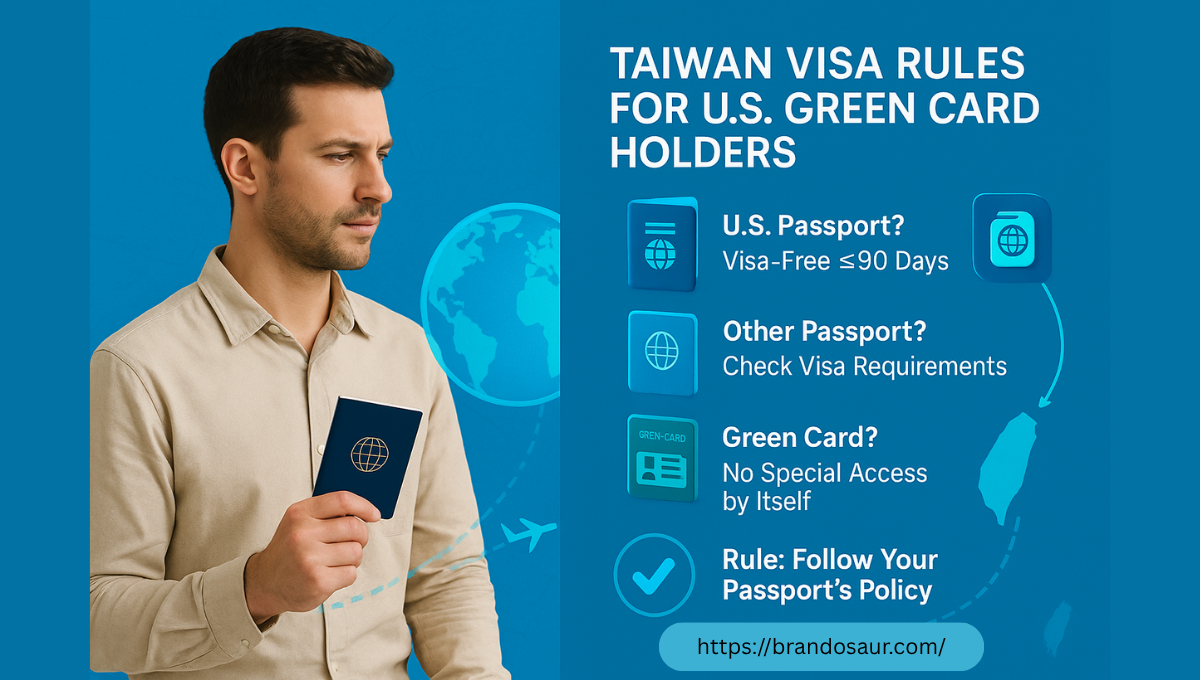
Chile Visa for U.S. Green Card Holders
Chile allows U.S. citizens to visit visa-free for up to 90 days. U.S. permanent residents hold U.S. passports, so they enjoy the same rule: no tourist visa required for a stay of 90 days or less. Again, the Chile visa for U.S. green card holders is governed by your passport country. If you have a U.S. passport, Chile waives the visa for short trips. (If your citizenship normally requires a Chilean visa, being a green card holder doesn’t waive it; you’d need to apply as any other foreign national.)
Barbados Visa Requirements for U.S. Green Card Holders
Barbados generally does not require a visa for U.S. passport holders. The U.S. State Department notes: “U.S. citizens must have a valid U.S. passport to enter Barbados. No visa is needed for stays up to 6 months”. Thus, Barbados visa requirements for U.S. green card holders are simply the same as for American citizens: with a U.S. passport, no visa is needed for visits under 6 months. However, once again, this hinges on your passport.
Green card holders of other nationalities should check if their passport country needs a Barbados visa, because a U.S. Green Card by itself does not confer any additional exemption beyond what the passport offers.
Visa Requirements by Country
For quick reference, here is a summary of visa rules for U.S. Green Card holders visiting various countries:
Country | Visa Requirement (for U.S. permanent residents) |
Italy | Schengen visa required. U.S. permanent residents must apply for a Schengen visa; only U.S. passport holders get visa-free entry. |
Greece | Schengen visa required. Green card holders must obtain a Greek (Schengen) visa for tourism; visa-free access is only for U.S. nationals. |
Taiwan | No visa for U.S. passport holders (<90 days). Green card holders follow visa rules of their home country: U.S. residents from visa-exempt countries can enter freely, others must apply normally. |
Chile | No visa for U.S. passport holders (up to 90 days). Likewise, U.S. permanent residents entering on a U.S. passport need no visa. |
Barbados | No visa for U.S. passport holders (up to 6 months). Green card holders of other nationalities follow the same rule as their passport country. |
Benefits of U.S. Citizenship vs Green Card
Obtaining U.S. citizenship grants additional rights and protections beyond a Green Card. Key benefits include:
- Voting and civic participation: Only U.S. citizens may vote in federal (and most state) elections. Green Card holders have no voting rights.
- Passport: U.S. citizens can obtain a U.S. passport for international travel. A Green Card holder cannot get a U.S. passport.
- Family sponsorship: Citizens can sponsor a wider range of family members (including parents, siblings, and married children) and face shorter waiting lists. Green Card holders can sponsor only spouses and unmarried children, and face longer visa queues.
- Job opportunities: Certain government and security-clearance jobs are open only to citizens. Citizens generally have broader work eligibility (outside the visa/work permit system) than green card holders.
- Deportation protection: U.S. citizenship provides strong protection against removal. (Green Card holders can be deported if they commit certain crimes or violate immigration rules.)
- Stability and rights: Citizens cannot lose status except through rare renunciation or fraud, whereas Green Cards can be revoked.
In summary, citizenship offers “more possibilities and security”, including the right to vote and immunity from deportation for crimes, that permanent residents do not have.
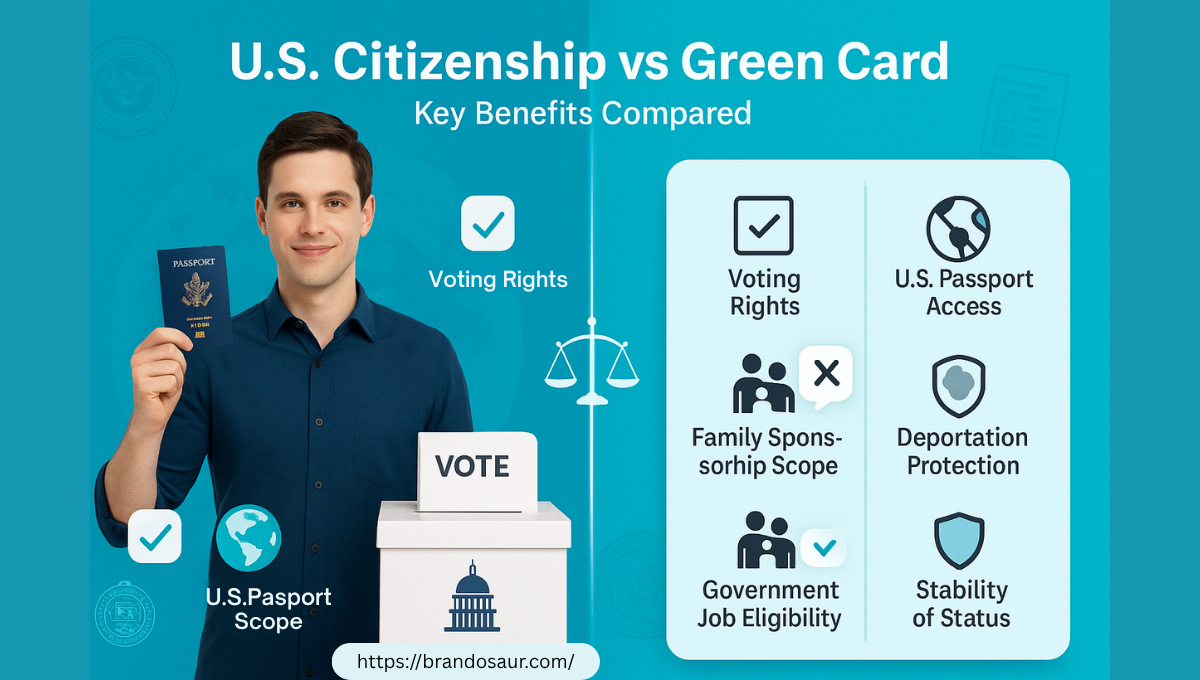
Can I stay in U.S. while waiting for Green Card?
Yes, if you have filed an adjustment of status (Form I-485) or similar application, you may remain in the U.S. while it is pending. USCIS advises that applicants must maintain lawful presence. Importantly, if you leave the U.S. before your green card is approved and without proper travel documents, you risk abandoning your application.
As USCIS notes, “if you have a pending Form I-485 and you leave the United States without an advance parole document, you will have abandoned your application”. In practice, this means you can stay in the U.S. while your green card is pending, but you should apply for advance parole (Form I-131) before any international travel.
How Long can I Stay Outside U.S. with Green Card?
Temporary travel abroad is generally fine, but long absences can jeopardize your status. USCIS explains that “temporary or brief travel usually does not affect your permanent resident status.” However, absences can be problematic if they suggest you did not intend the U.S. to be your permanent home. As a rule of thumb:
- Trips of less than 6 months are typically safe and do not raise abandonment issues.
- Absences of 6 months to 1 year may disrupt the continuous residency required for naturalization, so consider applying for a reentry permit.
- Absences of more than 1 year will generally cause loss of permanent resident status unless you obtained a re-entry permit before leaving. A re-entry permit allows an absence of up to
- 2 years without losing status. In summary, how long you can stay abroad depends on planning: short trips are fine, but staying over one year requires formal permission to avoid abandonment.
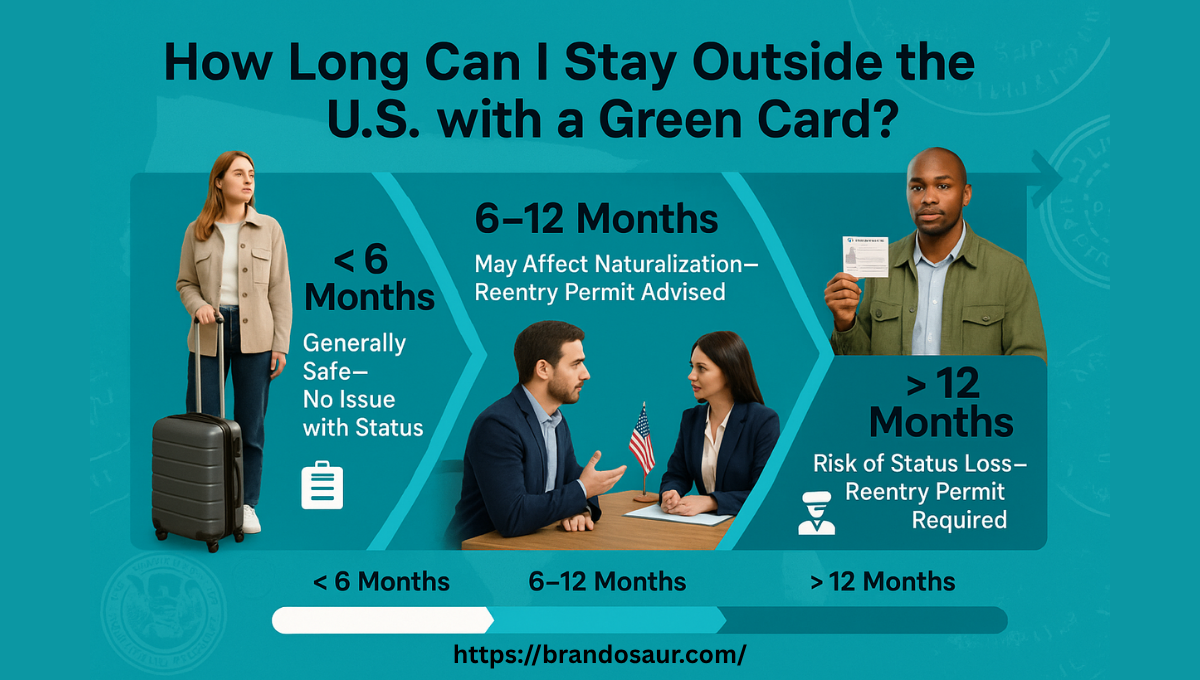
Can a Green Card Holder Get a U.S. Passport?
No. Only U.S. citizens are eligible for a U.S. passport. A Green Card holder is a lawful permanent resident, not a citizen. The U.S. government explicitly contrasts the two: citizenship grants you a passport for international travel, voting rights, and full civic participation, whereas permanent residents do not receive these privileges. If you hold a Green Card and want a U.S. passport, you must first naturalize and become a U.S. citizen.
Can You Work in the U.S. Without a Green Card?
You may work in the U.S. only if you have proper authorization. USCIS makes this clear: “No alien may accept employment in the United States unless they have been authorized to do so.”. A Green Card holder is authorized to work under their status, and U.S. citizens need no separate permit. But without a Green Card or other work authorization (such as an H‑1B visa, employment authorization document, etc.), one cannot legally work. If you are not a permanent resident or citizen, you must obtain a valid work visa or an Employment Authorization Document (EAD) before being employed. Working without authorization is not allowed under U.S. immigration law.
How Long Does It Take to Get U.S. Green Card?
There is no single answer; it depends on the category. Generally, the timeline has two parts: waiting for a visa to become available, and USCIS processing once you can apply. Boundless Immigration explains that most people’s total wait time is the Visa Bulletin waiting period plus the USCIS processing time. Key points:
- Immediate relatives of U.S. citizens (spouses, unmarried children under 21, parents) have no visa backlog and can often complete the process in about 1–2 years (depending on USCIS workload).
- Family-preference categories (siblings, married children, etc.) and most employment categories often face long waits. For example, those from India or China in EB‑2/EB‑3 categories may wait many years or decades due to per-country limits.
- Employment-based cases with PERM labor certification can add 18–24 months for the labor certification step alone, then several more months for I-140 and I-485 processing.
- Premium processing (15‑day turnaround) is available for many employment petitions (I-140), but it does not shorten the visa wait.
In summary, how long it takes ranges from under a year (for some marriage cases) to many years (for oversubscribed visa categories). Always check the current Visa Bulletin and USCIS processing times to estimate your specific timeline.
Summing Up
This guide has answered the top Green Card FAQs on travel, visas, sponsorship, and related rules. We’ve shown, for example, that U.S. permanent residents can visit Canada visa-free and Barbados without a visa, but must follow normal visa rules for Europe. We explained that U.S. citizens cannot sponsor cousins, Green Card holders cannot get U.S. passports, and working legally in the U.S. requires authorization. Finally, we compared citizenship versus permanent residency benefits.
For more in-depth guidance on specific Green Card paths, see our articles on employment-based and extraordinary-ability visas (for example, EB1A vs O-1 visas or the EB1A application process). Understanding your options, whether it’s family sponsorship or self-petitioning, is key. Our Employment-Based Green Card and Self-Petition Green Card guides offer additional details. Wherever you are in your journey, thorough research and planning will help you navigate the Green Card process successfully.





